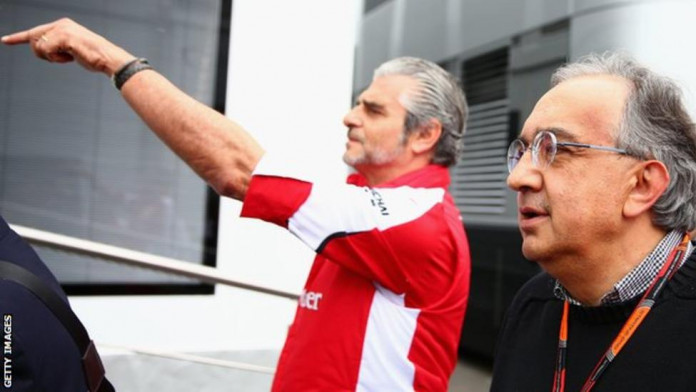
Ferrari say they could consider their future in Formula 1 if the rules change in ways they do not like.
President Sergio Marchionne said quitting was “possible but very, very unlikely”, adding: “Ferrari would find other ways to express its ability to race and to win.
“Ferrari cannot be put in a corner on its knees and say nothing.”
The warning comes as F1 boss Bernie Ecclestone is pushing for the sport to switch to cheaper, simpler engines.
What is behind Marchionne’s comments?
Marchionne’s remarks are the latest development in an ongoing power struggle in F1 between the road-car manufacturers on one side and Ecclestone and Jean Todt, president of governing body the FIA, on the other.
The manufacturers succeeded last month in killing off a plan by Todt and Ecclestone to introduce a cheaper alternative engine that would race alongside the turbo hybrids.
That followed the use of Ferrari’s contractual right of veto in October to block a move by Todt to force a cap on the price at which engines are sold to customer teams.
But the manufacturers have been forced into agreeing to look into ways of changing the engines – making them simpler and cheaper, guaranteeing their availability and making them noisier.
Ferrari have also protested against the decision by the FIA to grant Ecclestone and Todt a mandate “to make recommendations and decisions regarding a number of pressing issues in F1”.
Ferrari’s objection to Ecclestone
Ferrari have written to the FIA expressing their view that it has no right to grant Ecclestone and Todt this power and that the rule-making procedure must be followed.
Marchionne said: “It’s a choice that we obviously do not share, because we believe that the development of the regulations should be done in a coordinated manner.
“This view is also shared by Mercedes and Renault. Here we spend hundreds of millions of Euros, so we are talking about decisions that should not be taken lightly.
“The problem is that in trying to create a power-unit that is more affordable for smaller teams, we are in a way taking away from those organisations that are able to develop. And that is the reason why we go racing.
“We go to the track to prove to ourselves and to everyone our ability to manage the power unit. If we begin to undermine this advantage, Ferrari has no intention of racing.”
He said simplifying the technology in F1 in the manner of the popular US-based Nascar stock-car racing series would mean the car manufacturers “would lose the advantage of experience in track solutions, which can then have an impact on production”.
He said he “understood very well” the precarious financial situation of some of the smaller teams, but added: “This is something that FOM (Ecclestone’s commercial rights company) has to solve; it is not something Ferrari has to solve.”
Marchionne also described Ecclestone’s frequent proposals to return to the V8 naturally aspirated engines used until 2013 as “an insult”.
He said: “The climate summit in Paris has shown all of us where the path leads. We cannot ignore a technology that is relevant to production vehicles.
“In five to 10 years, the majority of all vehicles will be equipped on the road with hybrid technology.”
Why did Ferrari use its veto on cheaper engines?
Marchionne said he had blocked the plan to limit the price of customer engines because it meant an outside body interfering in Ferrari’s business plan.
“We used [the veto] recently because the proposal was out of place,” Marchionne said.
“The problem of this sport is that the regulator cannot impose conditions on the economic management of the team.
“When we are told that we must make the engine and then sell it for two pounds, from the economic point of view this argument does not stand – because it is going to change the dynamic business that we are managing.
“The economic conditions by which the Ferrari engine is provided to a customer cannot be established by the F1 Commission.”
Ferrari v Red Bull
Marchionne also described as “offensive” the idea that Ferrari should be under an obligation to supply Red Bull with its best engines.
Red Bull fell out with engine partner Renault but has been forced to continue with the French company after failing to secure a supply from Mercedes, Honda and Ferrari.
Red Bull and Ferrari failed to reach an agreement because the drinks giant insisted on having the same specification of engine as the works team.
Marchionne said: “Red Bull is an incomplete team. Because if you have an excellent chassis, but you lack the engine, then you are not complete.
“Without the power unit you can have a great chassis, but you will not become world champion: you will remain in the garage. So you have to do a deal with a manufacturer.
“But what I find really offensive in this whole affair was the claim that someone had to give them an engine to strengthen what is already a very competitive position for them.”












